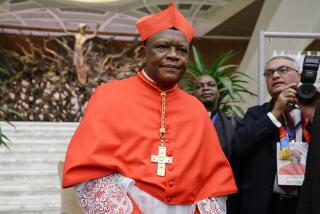Bishops Soften Rejection of Vatican Document
WASHINGTON — After considerably softening the tone of their response, the nation’s Roman Catholic bishops on Wednesday rejected a proposed Vatican document that calls into question the existence and nature of national conferences of bishops such as their own.
The U.S. bishops asked the Vatican to start over with a new document based on input from a broader representation of church leaders. It should display “better theological method . . . more cogent evidence . . . greater directness and precision . . . (and) more clarity and consistency,” the bishops’ paper said.
Their statement was approved, 205 to 59, in secret balloting that barely passed the required two-thirds of the 305 bishops eligible to vote.
Viewed as Concession
The rewording of the original blunt response drafted by a panel of past presidents of the National Conference of Catholic Bishops was a concession to moderate and conservative bishops. They expressed concern here that their rebuttal to the Vatican paper should show utmost diplomacy and tact lest it be interpreted as defiance of papal authority.
Several bishops referred to the lengthy debate over the issue and the final, carefully nuanced language of their reply as “the civility factor.”
Describing the bishops’ discussion, Los Angeles Archbishop Roger M. Mahony said, “The debate was over whether to ‘stick it to the Holy See.’ But the real issue was that we convey (to the Vatican) our concern that the theology of their document be on a sound basis.”
Vatican critics have held that the increasing power of national bishops’ units poses a threat to the monolithic nature of the church and might undermine the authority and teaching power of individual bishops as well as the Pope himself when he acts as the supreme Bishop of Rome.
At stake is the future direction of the national conference: Whether the bishops, acting collectively, can continue to authoritatively adopt position statements on such topics as nuclear disarmament, the economy, and pastoral and doctrinal concerns.
This activist role of the U.S. hierarchy, as well as that of other national bishops’ bodies, has caused friction with Rome in recent years.
Pope John Paul II in 1985 ordered a church-wide study of bishops’ conferences, and the working paper issued by the Vatican Congregation for Bishops earlier this year asked for comment from the world’s 100 national conferences.
The Vatican draft said bishops’ conferences lack a clear theological and biblical basis and warned that they could become excessively bureaucratic.
The U.S. response committee, chaired by Bishop James Malone of Youngstown, Ohio, argued that the Vatican statement had fundamental flaws and appeared to be one-sided and too polemical.
But it soon became clear here that many bishops feared that the same criticism could be leveled at their response--at least in the original draft, which received major media attention pointing out the sharp language and suggesting that a rift existed between the U.S. church and Rome.
Much of the wording that many bishops had considered confrontational had already been removed by committee rewriting done since the bishops’ conference opened on Monday.
But by voice vote Wednesday, the bishops also removed the Latin words “non placet”-- not suitable--from their evaluation of the Vatican paper.
However, they narrowly voted to retain a paragraph that says: “We do not believe that the working document is suitable as a basis for discussion, and we believe it should be replaced with another draft.”
Cardinal Edmund Szoka of Detroit led a move to also delete that language as “inappropriate . . . offensive and in bad taste.” His effort failed on a 127-127 tie vote.
In other action Wednesday, the U.S. bishops approved guidelines that, if ratified by the Vatican, will more clearly spell out when lay people can preach in Catholic settings.
The guidelines express overwhelming support for lay preaching as a way to cope with the lack of priests in many places and demands by lay people for greater participation. But they nonetheless make it clear that lay people may not preach the homily--the sermon interpretation of the Gospel--during the Mass itself, which is reserved for ordained clergy and deacons.
But, subject to implementation by local bishops, the new rules would permit lay people to preach during other parts of worship and at various celebrations such as retreats, revivals and youth gatherings.
More to Read
Sign up for Essential California
The most important California stories and recommendations in your inbox every morning.
You may occasionally receive promotional content from the Los Angeles Times.










